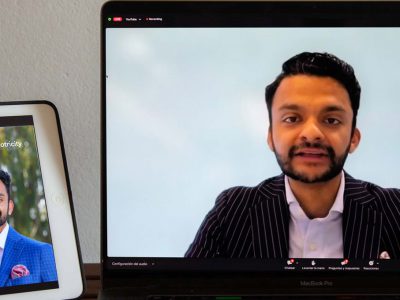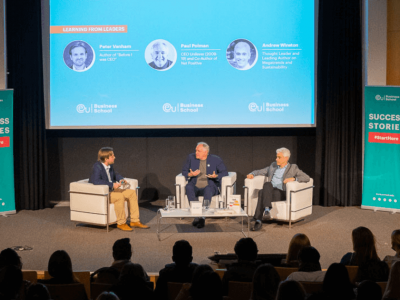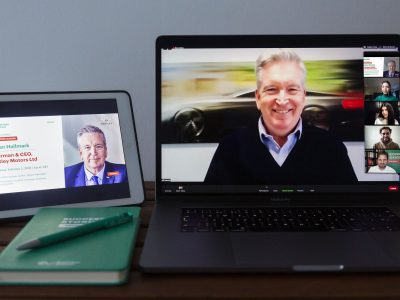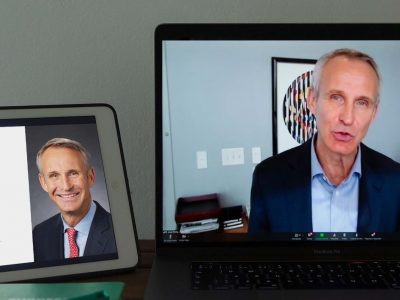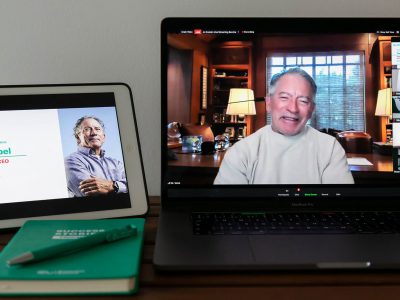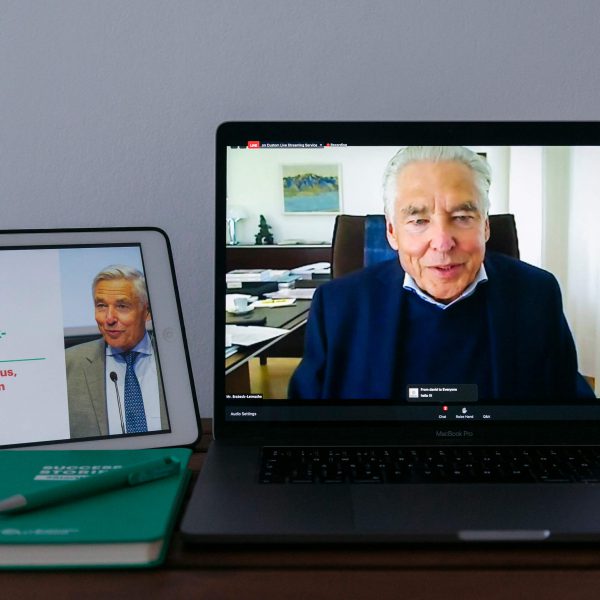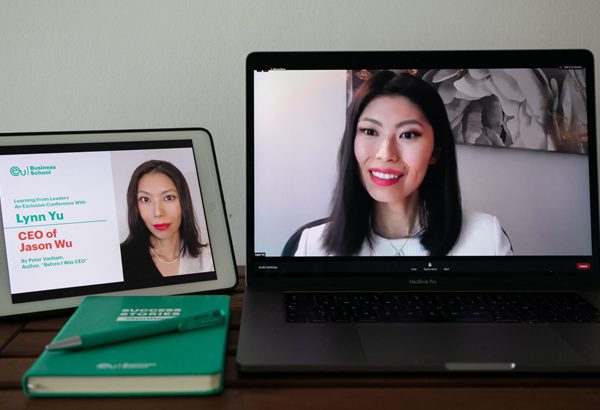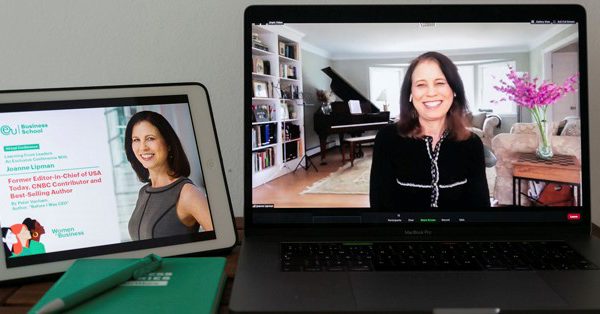Insights From Dr. R. Seetharaman, CEO of Doha Bank
EU alumnus Dr. Raghavan Seetharaman has been recognized globally for his contribution to banking and sustainability. His vision of a greener, more equal and harmonious world has informed the trajectory of his career and his leadership philosophy.
In another insightful deep dive interview, Peter Vanham, author of “Before I Was CEO”, spoke to Dr. Seetharaman about his life, beliefs and predictions for the future. How do you navigate crisis as the CEO of Doha Bank, operating in 20 countries with US$30 billion in assets? How can you bring people on the journey with you to believe in, and work towards, creating a better world? Dr. Seetharaman answered these questions and many more in this honest and uplifting conversation.
You can find the full event recording here. In this blog, we’ve extracted some highlights from the discussion.
Finding Opportunity in a Global Pandemic
The pandemic presents a global challenge, Dr. Seetharaman remarked. Unlike the global recession of 2009, which is often mentioned in tandem with the current crisis, the coronavirus has affected developed and developing economies alike. Every country around the world now faces a recession. However, with a tirelessly optimistic attitude, while nonetheless recognizing the tragedy caused by COVID-19, Dr. Seetharaman encouraged the audience to see the opportunities it offers.
Widespread digitalization accelerated by the need to access work, goods and services remotely, means equality of access to opportunities is increasing. We now know, practically, that hiring talent need not be restricted by location. A knowledge economy will allow companies to find the best people regardless of class, color, creed or country. Similarly, talented people will be able to access the best opportunities and professional roles in which they can excel.
During lockdown, corporate courts have been settling disputes online, suggesting there is a future for the digitalization of governance, peace and justice. Furthermore, a digital economy will lead to greater transparency and equality and makes a carbon-neutral future increasingly possible.
“Sustainability, human, social and economic development need to converge to make sure we don’t lose this planet”, Dr. Seetharaman said.
In banking, he encourages investment in projects, companies and people who are striving for a more sustainable future. Only then will we make sure that money being poured into the economy by global banks will be repaid. We want to be able to look back and say, “We used that negative moment to make positive change”, Peter Vanham agreed.
Navigating Crisis in Banking
For companies to survive the pandemic it’s essential to embrace change; “Transformation is here to stay […] we need to accept the change and adapt ourselves”, Dr. Seetharaman advised.
He offered a step-by-step guide to responding to the crisis. While he spoke from a banking perspective, there are valuable insights here that can be applied across business.
1. Remedial management: The first requirement for any company is to take immediate action to respond to a crisis and make sure that operations continue.
2. Refine the business model: Once you have regained a measure of stability, reassess your business model. For Doha Bank, this meant rapidly digitalizing all services, accelerating a trend that was already well advanced. Customers have moved “from brick to click”, Dr. Seetharaman noted. Ensuring all products and services were available online was essential to maintaining relevance and profitability.
3. Work on your revenue model: Look to the future. In banking, it was necessary to move from a competitive environment to a collaborative model where institutions can offer increased value to customers. For a sustainable world and to ensure continued growth and success, Doha Bank needed to build relationships with partners in order to offer the suite of products and services customers expect.
4. Embrace the knowledge economy: With remote working now established and effective across the business world, it’s time to embrace a knowledge economy. It’s no longer necessary to find talent near to business HQs; companies can seek the best individuals regardless of where they are based.
5. Invest in the future: Opportunities presented by the crisis should inform business strategy. For Doha Bank this meant continuing on a path they had already embraced, investing in water conservation, recycling industries and small and medium-sized enterprises that focus on sustainability, among other green initiatives.
Dr. Seetharaman approaches the crisis with optimism, seeing a unique opportunity to break down dividing lines that cross our society, from wealth to race and class. “Everyone has to be brought in”, he declared; a sustainable future is one that promises equality and quality of life for us all. “This is a global re-set.”
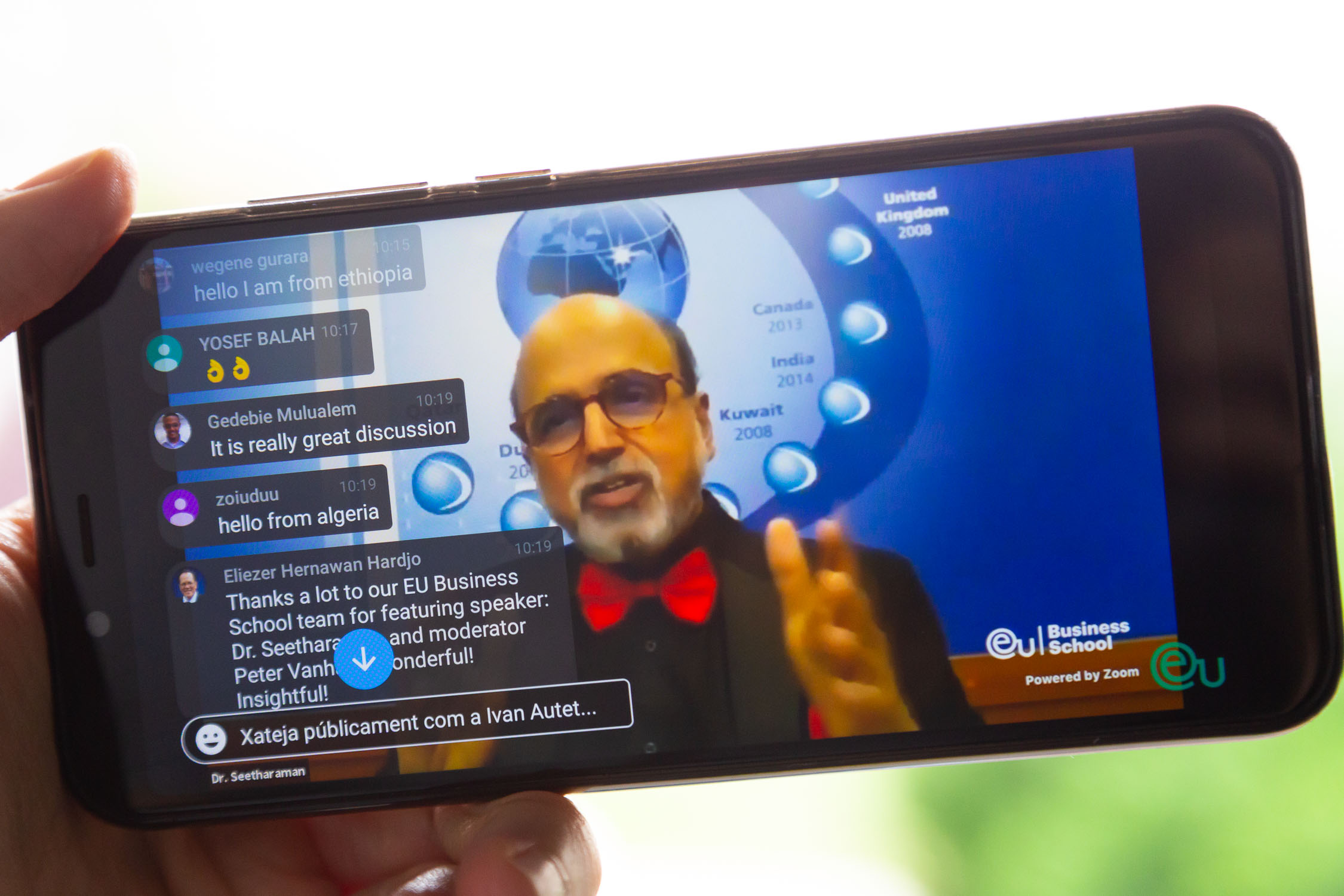

Leading With Philosophy
Dr. Seetharaman was raised by parents who instilled strong philosophical beliefs in their son. He was taught to transform challenge into opportunity and duty into destiny.
“With education, meditation and integrating your heart and mind you consciously drive your values.”
Dr. R. Seetharaman
To summarize his approach to life and his career, Dr. Seetharaman quoted Andrew Carnegie; “Men are developed the same way gold is mined. When gold is mined, several tons of dirt must be moved to get an ounce of gold; but one doesn’t go into the mine looking for dirt—one goes in looking for the gold.”
His unwavering optimism shone throughout the conversation, offering the audience a clear example to follow. Here, some quotes from Dr. Seetharaman himself suggest how to approach life, success and leadership:
“Every day is inspiring; every challenge is motivating.”
“When there is beauty in your character there is harmony in you.”
“A good corporation can create a good society.”
“Excellence is not a one-time act, it is a habit.”
Determination Can Take You to the Top
Growing up “poor in money but rich in knowledge” as Peter Vanham explained, Dr. Seetharaman was encouraged by family and teachers to believe he could create his own destiny.
“Destiny is a matter of choice not chance”, he explained.
This guiding principle informed his determination to attend not the local village school, but the much better institution 10 miles down the road. Undeterred by the fact that his parents could not afford to send him there, Dr. R. Seetharaman spoke to the headmaster to secure a scholarship and free board. From there he continued to overcome the challenges that came his way. When he was rejected from medical university due to his caste, Dr. Seetharaman chose to see that there were many paths he could take and opted for another, coming to love that choice as if it were his first. This, again, has been a trait that’s courted success throughout his career.
After gaining a bachelor’s degree in commerce in Madras, Dr. Seetharaman went on to become a chartered accountant. Peter marveled at his continued determination to study, given his economic prospects as a bachelor’s graduate. Dr. Seetharaman quoted; “When you aim at the short-term you cultivate flowers, when you aim medium-term you cultivate trees, but when you aim long-term you build humanity.”
“I wrote my life journey at age 13”, admitted Dr. Seetharaman. With his sights always set on the long-term, Dr. Seetharaman was determined to create the future he wanted to live. He was offered a role from one of the big four accountancy firms, PWC, and moved to Mumbai, immediately taking on management responsibilities. After two years proving his ability and commitment, Dr. Seetharaman was offered the chance to move to the Middle East, kickstarting his international career.
Accountancy was not his only passion; Dr. Seetharaman was also fascinated by technology. After successfully completing a PWC project within a bank, the CEO invited him to stay and work there in recognition of his talent.
Within two years, he was working directly with the CEO, second in the institutional chain of command. In those days there was extraordinary convergence between banking and accounting technology and Dr. Seetharaman was responsible for the digital transformation of the bank. Completing the project successfully led to another valuable opportunity, managing the merger with another bank. Mergers offer extensive learning, as Helena Hedblom, CEO of Epiroc, recently shared. The process of examining every detail of two companies and selecting the best of everything to create a single, robust and effective organization, gave Dr. Seetharaman insight across the entire business of banking.
Following the merger Dr. Seetharaman had the financial security to consider another venture. He decided to become an entrepreneur and set up his own digital bank. Despite having prepared everything to launch what he knew would be a successful business, regulators turned him down. In 1999 the system simply was not ready to support and regulate an entirely online bank.
With characteristic adaptability, Dr. Seetharaman chose another path and became a financial consultant for a bank in Qatar. The board of directors, seeking a leader who could take the bank successfully through a period of transformation, increase shareholder value and safeguard excellent customer experience, invited Dr. Seetharaman to take on the role of CEO. Although it took six months of deliberation before accepting the role, Dr. Seetharaman has never looked back. Now, 16 years later, he is still CEO of Doha Bank, having transformed it from an entity with US$100 million in assets and seven branches in Qatar, to being present in 20 countries with US$30 billion in assets. It is no surprise he has been named “Best CEO in Middle East” five times in the last 12 years.
But Dr. Seetharaman does not have a self-centered vision of leadership. He sees the beauty of corporate management in making sure that you get the best for everyone, in being humble, being wise and in being firm, not stubborn. Leadership is “not only one man, it is a team”.
Advice for a Purposeful Career
From this position of generosity, Dr. Seetharaman offered advice and encouragement to the EU community attending the discussion and participating with their questions.
Simon, a student from Zimbabwe, studies business management and finance at EU’s Barcelona campus. He asked Dr. Seetharaman how he could integrate social responsibility with career success.
“Only a good person can drive change. Ensure your thought leadership is full of righteousness.”
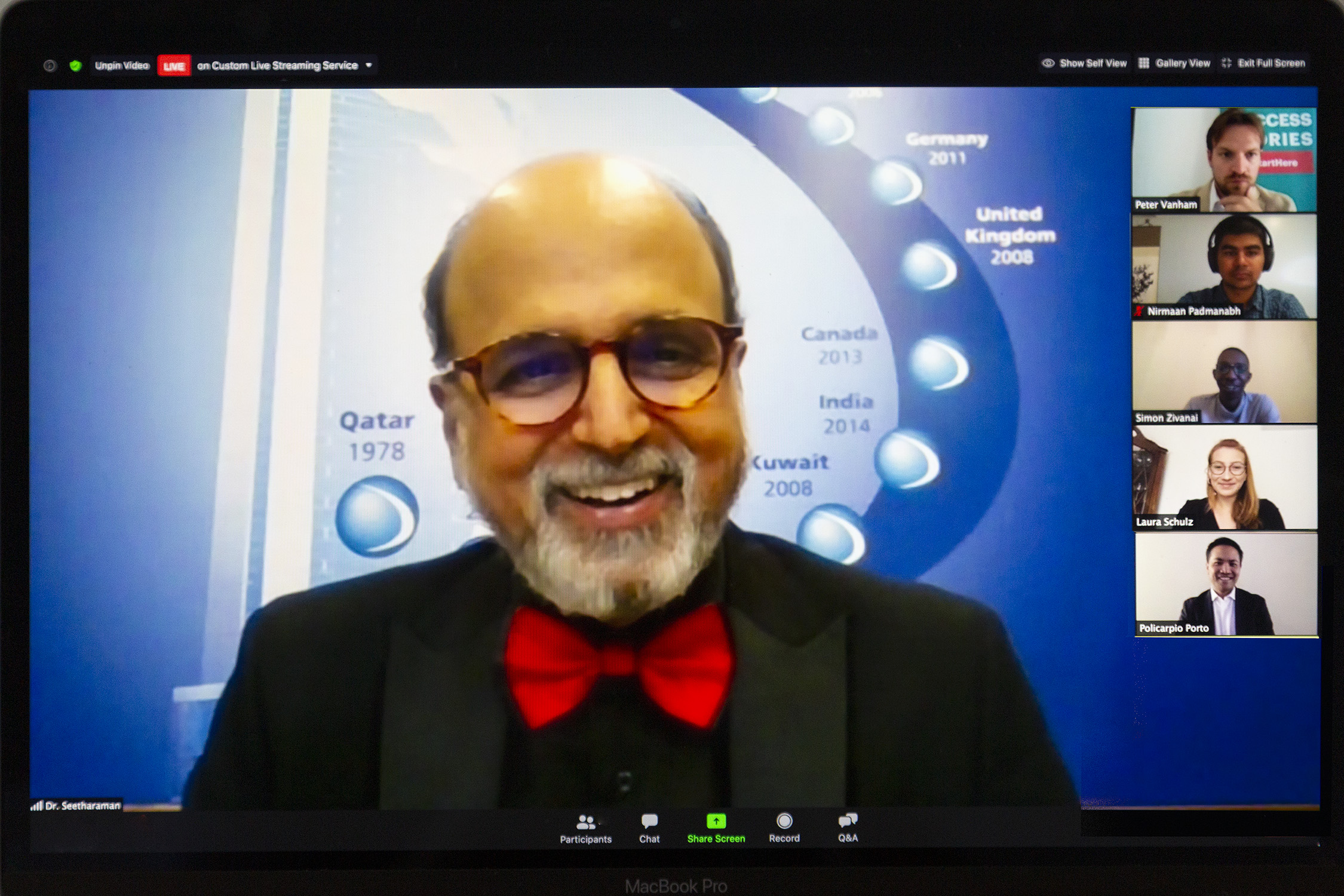

Dr. Seetharaman elaborated on the importance of mindset to achieving goals; “Every day cultivate the energy and enthusiasm in you”. It is down to us, he said, to “Set a design and turn the negatives into positives”. “Everything is an opportunity”.
When it comes to challenges; “Whatever the roadblocks, remain calm and composed and govern with good ethics” he advised.
Ultimately, he said; “Leadership is a positive attitude”. It was clear throughout the interview that this maxim is central to Dr. Seetharaman’s personal philosophy and approach to life. Given his extraordinary success, it is advice we will be following.
Fintech and the Future of Finance
There were two clear trends Dr. Seetharaman outlined in his conversation with Peter Vanham and the EU community.
When asked by Laura, a Brazilian student at EU’s Geneva campus, about inclusivity in banking, Dr. Seetharaman emphasized the importance he places in equality and described initiatives to move towards what he termed the “universal norm of gender equality”. Dr. Seetharaman explained how his mother had been his first inspiration, and with two daughters and a wife he admires, acting to progress gender equality makes perfect sense to him. Not only does he support many schools and educational programs for women in his native India, he runs initiatives across all levels of Doha Bank to promote equality of opportunity and female leadership. He believes that female participation in governance is essential.
Fintech is another key trend shaping the future of the financial industries. The fourth industrial revolution is disrupting the world with digitalization, and banking is not immune from this tide of change. Dr. Seetharaman projected that fintech will play a huge role in the future and already sees technology companies taking revenue that traditionally would have gone to financial institutions. It’s a shift that places further emphasis on the need, outlined earlier, to adopt a collaborative model and establish partnerships that will ensure the longevity of Doha Bank, and other traditional institutions like it.
Not only this, but fintech has a role to play in creating the better, more equal and sustainable future that Dr. Seetharaman so passionately believes in. Technology can be leveraged to make sure that the global banking system, as well as healthcare, education and justice, become accessible to all the world’s citizens.
Building a Better Tomorrow
For budding leaders looking to follow the inspiring example of Dr. Seetharaman, EU Business School offers an education that will prepare them to create a more sustainable, better world.
With a faculty comprising business leaders, consultants and entrepreneurs, and a pragmatic, experiential approach to education, EU Business School ensures students graduate with the sound knowledge base and insights from the cutting edge that are key to career success.
To kickstart your future, find out more about the highly ranked business programs we offer, from bachelor’s to MBA level, at our campuses in Geneva, Montreux, Barcelona, Munich and online.
Find out more about the inspiring life and journey of Dr. R. Seetharaman; watch his biopic The Truth.



